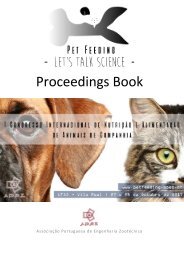Book of Proceedings I PetFeeding
Book of Proceedings I PetFeeding
Book of Proceedings I PetFeeding
You also want an ePaper? Increase the reach of your titles
YUMPU automatically turns print PDFs into web optimized ePapers that Google loves.
47<br />
treats/table scraps/extras can result in excess energy intake and nutrient dilution.<br />
Diet choice<br />
There are thousands <strong>of</strong> diets in the marked, made by hundreds <strong>of</strong> companies. The WSAVA<br />
has a document aimed for pet owners to help them navigate this complex market in their<br />
toolkit<br />
(http://www.wsava.org/sites/default/files/Recommendations%20on%20Selecting%20Pet%20<br />
Foods.pdf). Price alone does not determine the quality <strong>of</strong> a diet, and some diets are very<br />
expensive based on ingredient-based marketing and little investment in science and research.<br />
There are several maintenance diets with further specialization, such as sensitive<br />
skin/stomach, breed specific, size specific, etc. There are no <strong>of</strong>ficial recommendations on<br />
many <strong>of</strong> these items, but that does not mean that these diets only exist for marketing reasons<br />
and are without merit. These diets will differ in ingredients, fiber amount and type,<br />
macronutrient composition, digestibility, presence <strong>of</strong> omega 3 fatty acids, etc. It is important<br />
to consider all the groups <strong>of</strong> diets that make up the adult maintenance market and familiarize<br />
ourselves with their characteristics. This will allow customization when recommending a pet<br />
food for an adult dog.<br />
In short, choose a diet that is complete for adult dogs, that is from a reputable company, and<br />
that has nutritional and energy characteristics that adjust to the lifestyle and other<br />
characteristics <strong>of</strong> the dog and its owners. As circumstances change, diet changes might be<br />
necessary, which will be noted with subsequent nutritional evaluations.<br />
Feeding method<br />
The main feeding methods are ad libitum (food always available) or portion control (by time<br />
or by amount). Ad libitum feeding is easy and convenient, but is only recommended in cases<br />
where the adult dog is able to self-control their energy intake to maintain an ideal BCS.<br />
Portion control by amount is the best method to maintain a proper oversight on food intake<br />
and prevent undesired weight gain, but it is more cumbersome.<br />
Follow up<br />
Healthy adult dogs should be seen by their veterinarian at least once a year, and a nutritional<br />
evaluation performed at each visit to identify any items that can be caused by an inadequate<br />
feeding plan (such as obesity) or that can be managed by diet.



